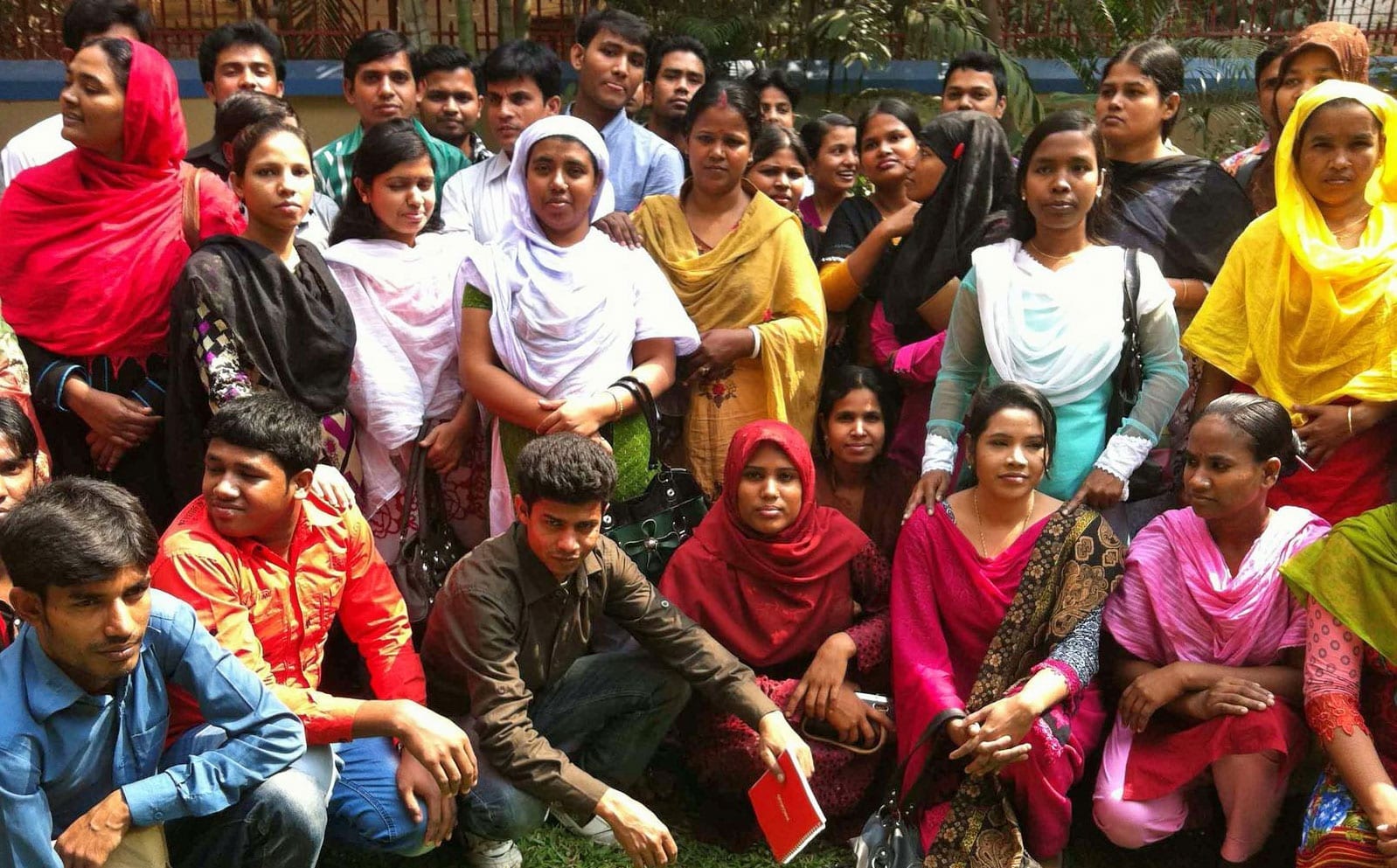
May 13, 2015
When a garment factory union organizer in Gazipur, Bangladesh, was beaten in April while meeting with workers about their nascent union, the Solidarity Center Bangladesh Worker Rights Defense Fund was there to help him cover the medical care he needed, an expense he otherwise could not have afforded.
The Solidarity Center launched the Bangladesh Worker Rights Defense Fund in April 2014, following an increase in violence and harassment against workers, many of them young women, who were seeking to form unions to protect their health, dignity and rights on the job. Donations of more than $15,500 over the last year from individuals and organizations have helped to provide costly medical treatment for organizers beaten or attacked while speaking to workers about their rights, and temporary food and shelter for workers fired for trying to improve their workplace.
Following the Rana Plaza collapse in April 2013 and other high-profile catastrophes, the Bangladesh government began recognizing worker rights and the country’s own labor laws, allowing workers to form representative unions. Garment workers have since established more than 300 factory-level unions and seen more than 15 collective bargaining agreements signed.
But in the past year, violence and retaliation against workers seeking safe workplaces, protection from sexual harassment and better-than-subsistence-level wages has escalated. “A severe climate of anti-union violence and impunity prevails in Bangladesh’s garment industry,” according to a March International Trade Union Confederation (ITUC) report. “The violence is frequently directed by factory management.”
When garment workers are allowed to form unions, they have the opportunity to create positive changes at their workplaces.
There’s still time to donate to the Bangladesh Worker Rights Defense Fund.
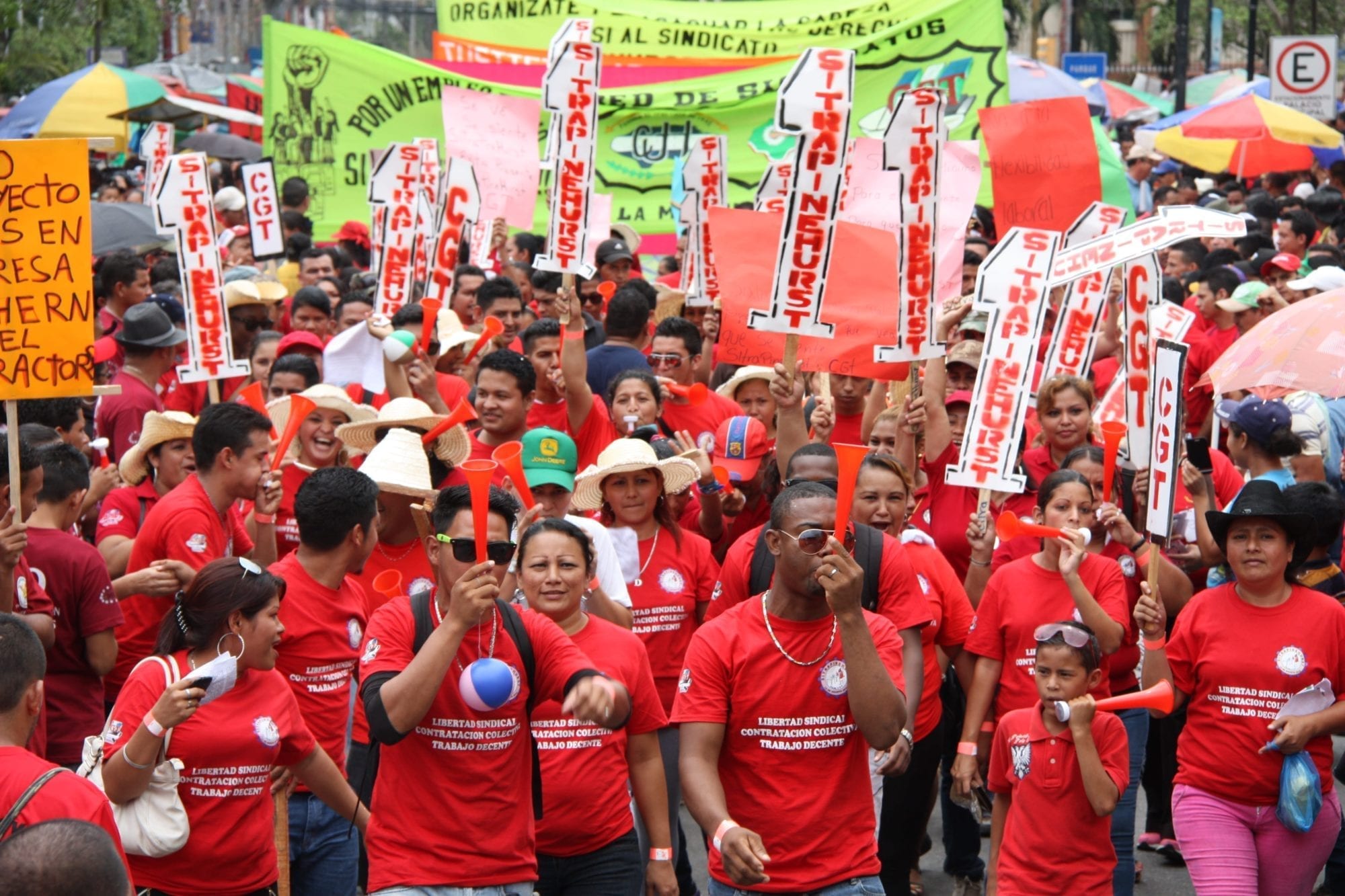
May 5, 2015
Hundreds of thousands of workers and their unions around the world marked International Workers Day May 1. For many, the day provided a time to push for living wages and safe workplaces. Yet this year, governments in some countries like Bahrain and Swaziland banned May Day celebrations or threatened workers with retaliation if they turned out—and some brave workers defied these edicts to exercise their freedom to gather in public spaces.
Elsewhere, workers like those in Bangladesh who often are prevented from forming unions or exercising their fundamental worker rights, called for the freedom to join unions and correct workplace injustices.
Sumi Begum, 25, a Bangladeshi garment worker, says that she and other workers at her factory have not received salaries or overtime pay for the past two months, but they cannot raise the issue with the manager because they fear they would be terminated if they did so.
“Garment factories that have union are not facing these kinds of problems,” she says. “The condition of those garment industries is much better than ours.”
[portfolio_slideshow id=4427]
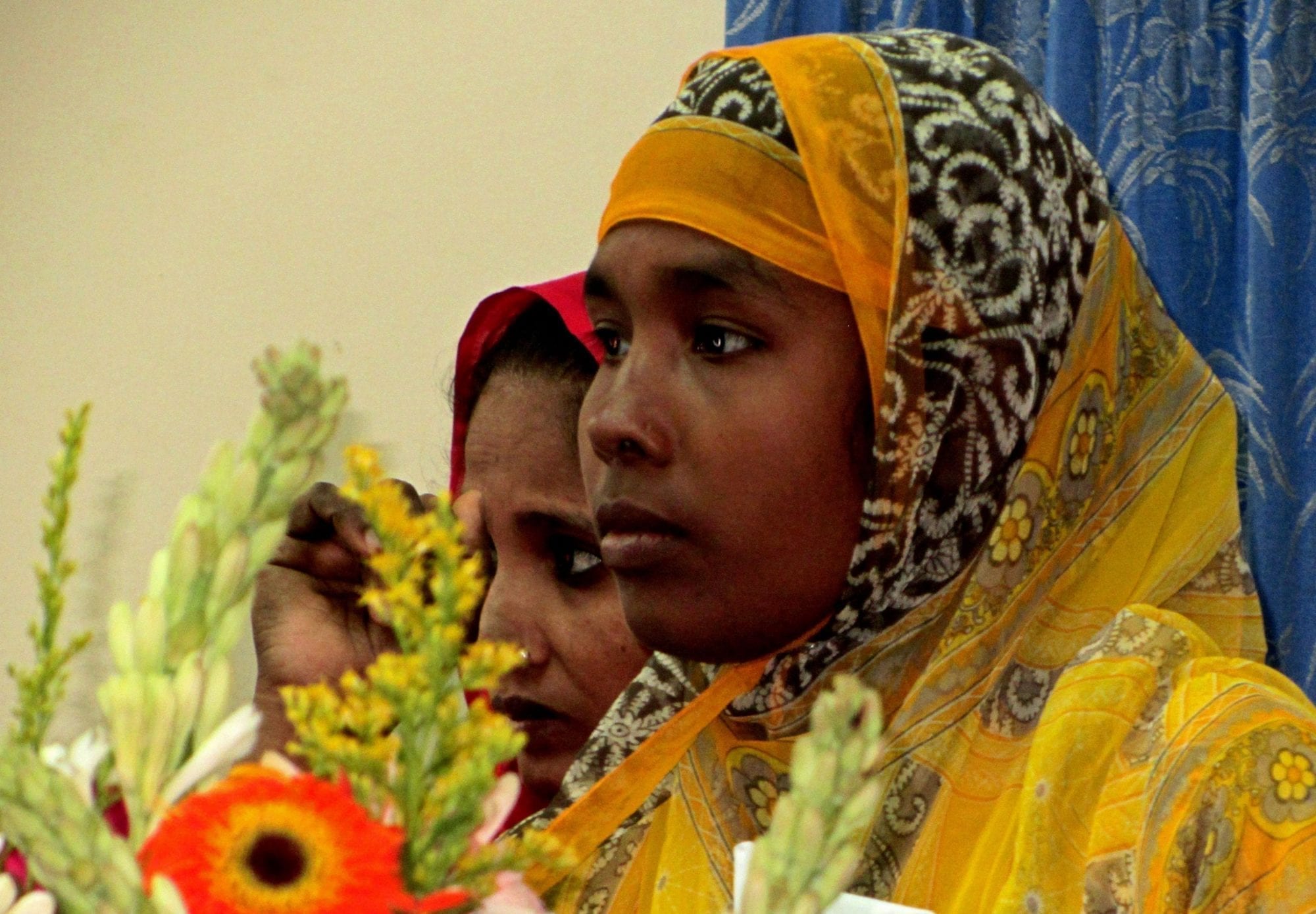
May 4, 2015
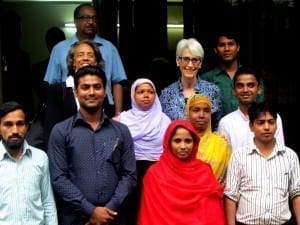
U.S. Under Secretary of State for Political Affairs Wendy Sherman met with garment workers on May Day at Solidarity Center’s Bangladesh office in Dhaka. Credit: Balmi Chisim
Bangladesh garment union leader Arman says this past May Day was extra special for him. “I will remember this day the rest of my life. I never imagined that I could share our struggles with a high U.S. official,” says Arman, 26, president of a garment factory union. Arman and seven other union leaders met with U.S. Under Secretary of State for Political Affairs Wendy Sherman at Solidarity Center’s Bangladesh office in Dhaka. Sherman is the fourth-ranking official at the U.S. State Department.
The high-level gathering also included U.S. Ambassador Marcia Bernicat; U.S. Special Representative for Commercial and Business Affairs Scott Nathan; Deputy Assistant Secretary of State for Democracy, Human Rights and Labor Steven Feldstein; and senior officials from the U.S. Embassy and U.S. Agency for International Development.
Tania, 23, a union leader, told the group that garment workers who formed unions saw benefits in many areas. Another union leader, Meem, 24, said some union leaders have been threatened by factory managers for forming unions. Ahsan, 26, described how garment workers are increasingly facing government obstacles when seeking to register their unions. Unions are required to register with the Department of Labor to legally operate.
In fact, official rejection of union applications has increased from 19 percent in 2013 to 56 percent so far in 2015, according to data compiled by the Solidarity Center in Bangladesh. Despite garment workers’ desire to join a union, they increasingly face barriers to do so, including employer intimidation, threatened or actual physical violence, and illegal firings. Regulators also seem unwilling to penalize employers for unfair labor practices.
Yet workers at Bangladesh’s more than 5,000 garment factories have made the country the world’s second-largest garment exporter, after China. Some 80 percent of Bangladesh’s garment exports—a $24 billion per year industry—are destined for the United States and Europe.
Solidarity Center Bangladesh Country Program Director Alonzo Suson told the gathering that although more workers have been allowed to form unions and improve their working conditions in the past two years, the government’s increased rejection of union registrations is concerning.
Solidarity Center staff updated the group on its ongoing fire safety program for garment workers, and gave examples of how union leaders applied the training during the recent earthquake, which was centered in Nepal but also felt in Bangladesh.
In her remarks, Sherman observed that most of the union leaders are young and this makes her optimistic about the prospect for improving Bangladesh’s garment industry. She praised the leaders for representing their co-workers in the face of many challenges. Sherman said that the United States was working with the government, brands, factory owners and unions to help build respect for workers’ safety and rights.
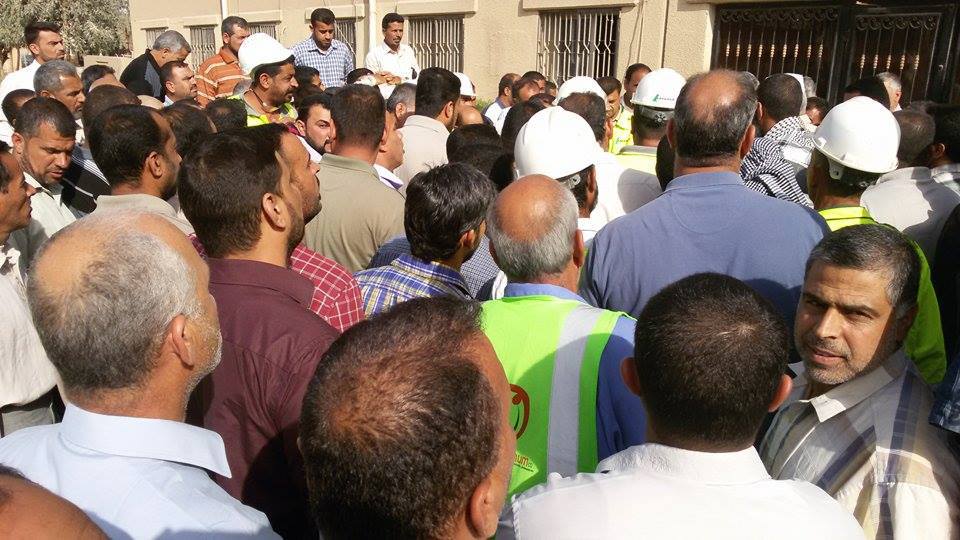
May 4, 2015
Some 350 workers at the Karbala cement plant signed a petition in April requesting representation in negotiations with management after management refused a similar request by a group of workers in February. The workers signed the petition after months of outreach by their co-workers to educate them on their rights.
Although Iraq law prohibits the workers from establishing a union because it is a public-sector factory, the plant receives International Finance Corp. (IFC) loans and IFC labor standards require respect for freedom of association. Also in April, cement workers staged a rally to urge management to meet with a committee of workers to discuss improving safety and health conditions and other key issues.
Workers at the plant, owned by Iraqi government but operated by a private company, say some have been unfairly penalized for asking for better wages and a safer work environment. One worker was transferred and another is being investigated, the workers say. The General Federation of Workers’ Unions in Iraq (GFWUI) sent a letter of support to the workers. “Your struggle is the struggle of all workers,” GFWUI wrote. (GFWUI’s letter in English and Arabic.)
Iraqi workers elsewhere are successfully improving working conditions at IFC-funded workplaces, using skills gained through Solidarity Center training programs, and are documenting violations and negotiating with management to improve working conditions.
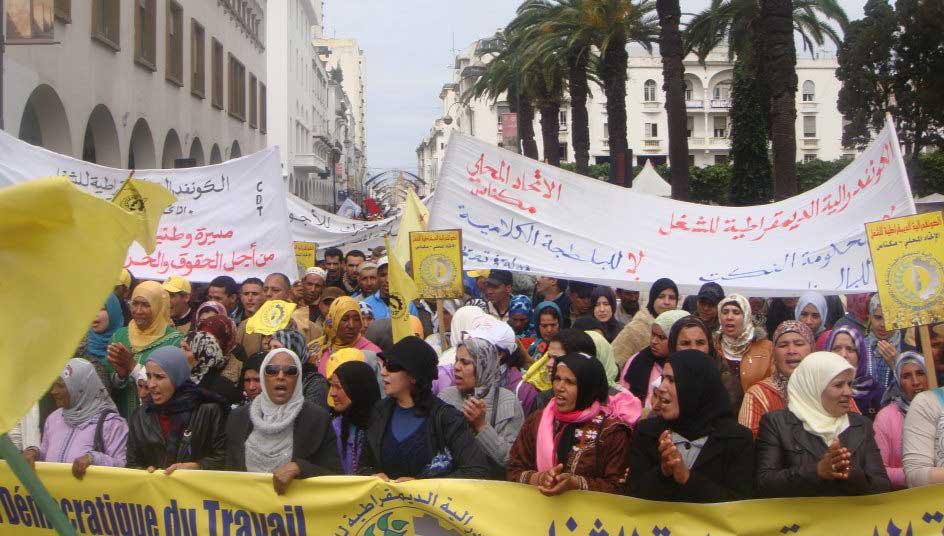
May 1, 2015
Workers in Bahrain, Burundi, Morocco, Swaziland and Turkey are standing strong in the face of economic and political threats this May Day.
May 1 is generally a time when workers around the world celebrate the dignity of work and working people’s social and economic achievements. But this year, governments in some countries have banned May Day celebrations, while elsewhere, workers are forced to protest lack of progress in attaining their share of economic prosperity.
Working women and men are undaunted by intimidation and, in some cases, risking their lives to exercise their freedom to gather in the public space and stand up for their rights. This year more than ever, May Day stands as a beacon for internationally recognized human and labor rights. Here’s a roundup.
Bahrain: The government on April 30 banned all May 1 rallies, forcing the General Federation of Bahrain Trade Unions (GFBTU) to abruptly cancel its weekend celebrations. The federation had planned a rally, medical camps, family outings and award ceremonies focusing on the rights of women and migrant workers in the workplace. Thousands were expected to attend the rally, including members of more than 45 GFBTU-affiliated trade unions.
Burundi: Hundreds of journalists and human rights activists have been arrested and Internet has been inaccessible in the capital, Bujumbura, in recent days following protests against the re-election bid of President Pierre Nkurunziza. Some journalists have been “beaten up and workplaces forced to close down,” one journalist told allAfrica. Civil society organizations and political movements have been denied the right to hold public meetings and assemblies. The Confédération Syndicale du Burundi (COSYBU) and the Organization of Free Unions of Burundi (CSB) cancelled May 1 festivities because of the country’s insecurity.
Morocco: The Moroccan union movement is boycotting May 1 celebrations and instead turning May into a month of protest. The Moroccan Labor Union (Union Marocaine de Travail), the Democratic Confederation for Labor (Confédération Démocratique du Travail) and the Democratic Federation for Labor (Fédération Démocratique du Travail) and others will protest the lack of movement in improving civil servants’ salaries, increasing the minimum wage and boosting minimum pension, per an agreement with the government in April 2011.
Swaziland: Despite a ban on May Day rallies, the Trade Union Congress of Swaziland (TUCOSWA) is encouraging members to turn out and “celebrate their day and not be prevented by actions that are at best unlawful.” Police announced that only “recognized unions” will be allowed to mark May Day. The authorities have refused to recognize TUCOSWA, and police have repeatedly broken up TUCOSWA meetings this year, injuring at least one union leader. “Our members are geared for their celebrations and will not be prevented by threats from the police,” says TUCOSWA Secretary-General Vincent Ncongwane.
Some Swazi pro-democracy activists and trade unionists have been imprisoned. Sign a LaborStart petition demanding their release. If you Tweet, use the hashtag #SwaziJustice.
Turkey: After hundreds of workers defied a ban on May Day rallies in Istanbul, riot police fired tear gas and water cannon on protestors in the city’s central Taksim Square. Unions had called on the government to lift its ban on “illegal demonstrations,” in Taksim. Much of Istanbul’s public transport is shut down and police helicopters are circling over the city.






